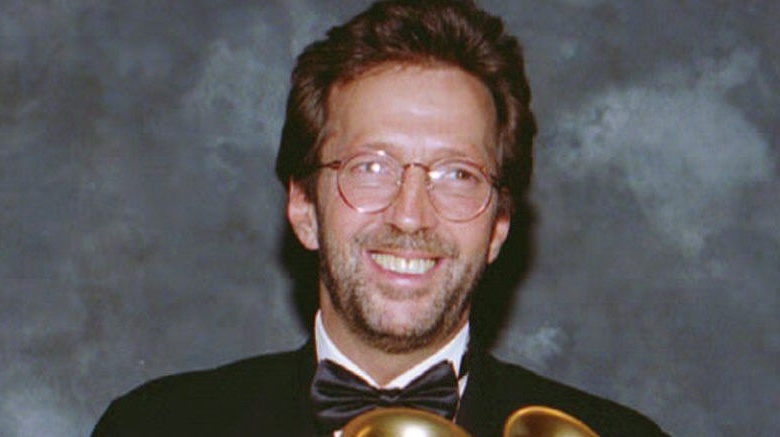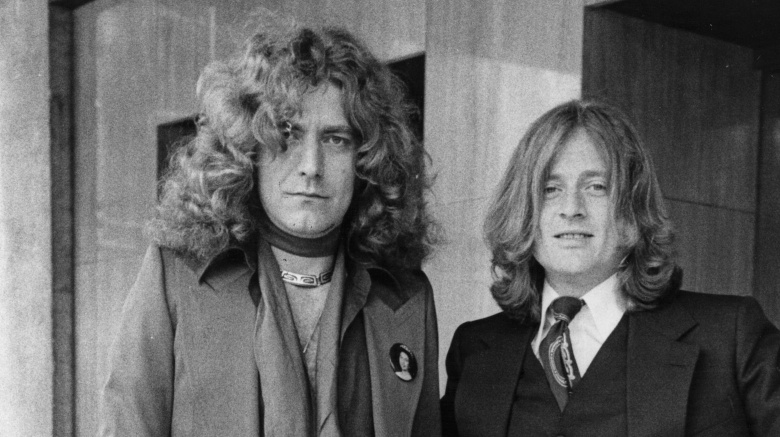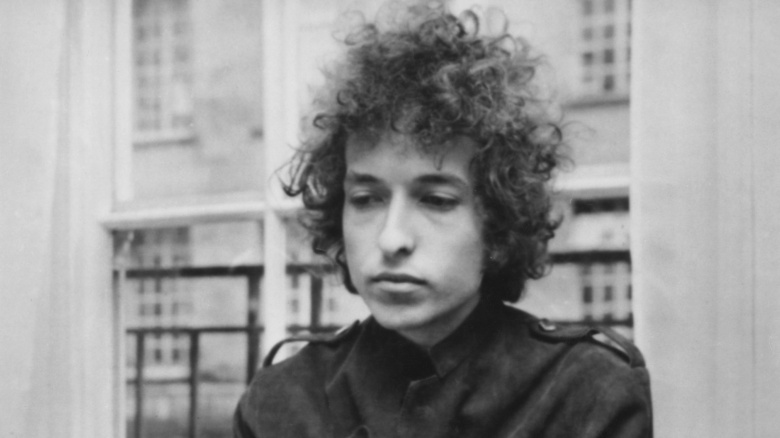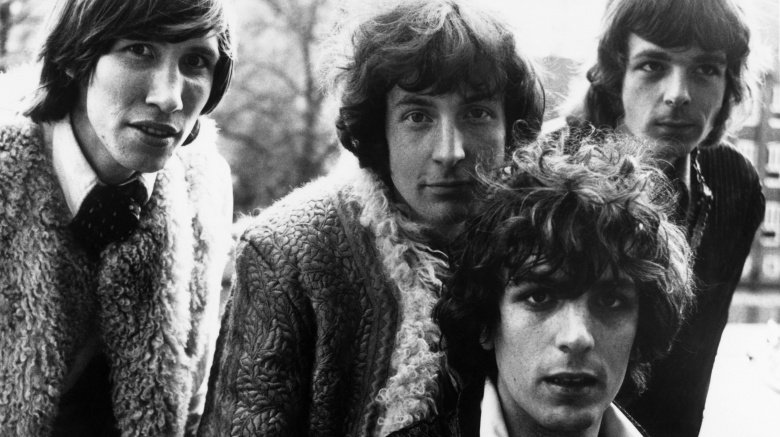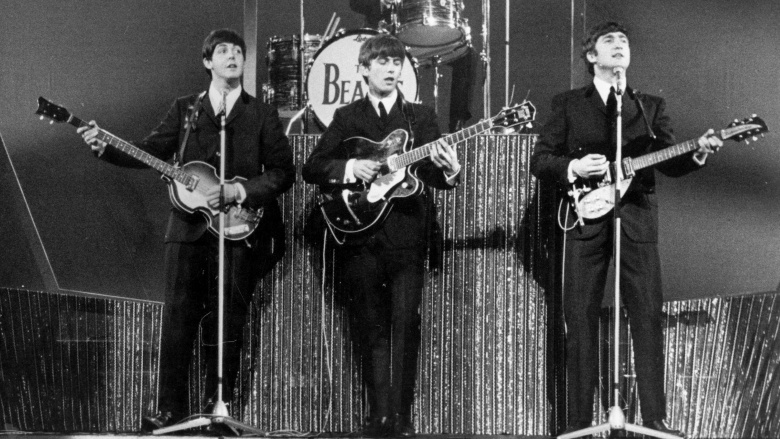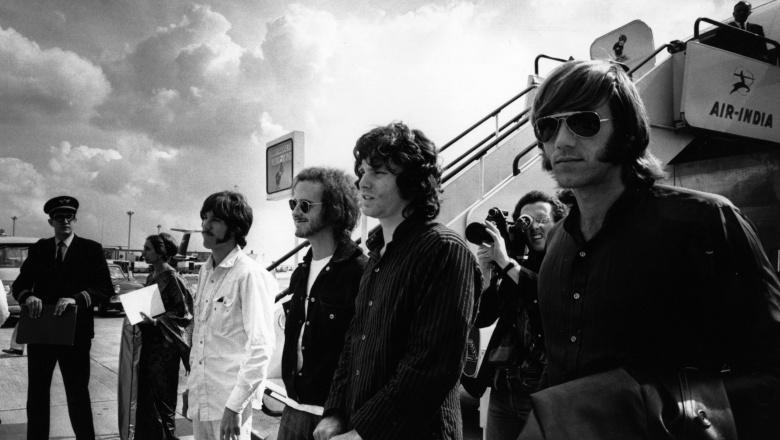Horrifying Incidents That Inspired Great Songs
The very best songs are the ones that strike you somewhere deep. Sure, meaningless jams might have enough of a hook or rhythm to ride the radio waves for a while, too, but the tunes that stand the test of time are those that touch on the truth. For some artists, making the kind of music that really sings to people can come at high personal costs, because the real-life experiences that inspired them are sometimes even more emotionally devastating than the songs themselves.
Tears in Heaven by Eric Clapton
The world will forever know the name of Eric Clapton's son, Conor, thanks to his father's 1991 hit song "Tears in Heaven." Clapton co-wrote the number with Will Jennings for the Rush soundtrack, shortly after Conor's accidental death earlier that year. Conor, who was just four years old at the time, fell out of the window of a 53rd-floor apartment in New York City while visiting his mother's friend — his tragic passing gutted the guitar icon, who was already mourning the loss of his manager, musician Stevie Ray Vaughn, and two friends of his tour group in a helicopter accident months before.
Clapton immediately turned to music as a means of escape from his bitter reality, and said that the song started coming into his mind shortly before he was hired to write something for the movie. "It's a little ambiguous because it could be taken to be about Conor, but it's also meant to be part of the film," he explained. Decades later, hardly anyone remembers the track for its cinematic origins, but no one can forget the anguish that was associated with its creation.
All My Love by Led Zeppelin
Led Zeppelin's lead singer Robert Plant also endured the unthinkable when his five-year-old son Karac fell ill with a stomach virus and died in 1977 while he was on tour. After receiving the terrible news, Plant left the band to be with his family and considered a new career in teaching, before being convinced by drummer John Bonham to rejoin the group.
It was then that they composed their eighth album, In Through the Out Door, which contained Plant's first of several song dedications to his lost son. "All My Love" was co-written by Plant and bassist John Paul Jones, but guitarist Jimmy Page once said neither he nor Bonham were "very keen" on the tribute track. They weren't cold or anything — they just felt it was too soft and might inspire crowds to do "the wave," which they felt was off-brand for the band.
Hurricane by Bob Dylan
Here comes the story of the Hurricane. Bob Dylan co-wrote his 1976 protest anthem after reading Rubin "The Hurricane" Carter's autobiography The Sixteenth Round, meeting with the imprisoned pugilist in jail to discuss his controversial conviction, and believing his claim of innocence.
In short, the then-light heavyweight boxer and his friend, John Artis, were found guilty of triple-homicide in New Jersey in 1966, after being stopped in their car which police said had ammunition like what was used in the incident. The evidence against the two was slim, however, since no fingerprints, paraffin testing for gun residue, or immediate witness identification put them near the crime. Months later, witnesses pointed to the pair as the assailants they'd seen, and Artis spent 14 years in prison as an accomplice. Carter, meanwhile, wasn't freed until 1985, when an appellate judge ruled that his conviction had been "predicated upon an appeal to racism rather than reason, and concealment rather than disclosure."
Sunday Bloody Sunday by U2
U2 might now be known for their participation in pop culture politicization, but before their 1983 album War, Bono's band was still working its way into international acclaim. The popularity of "Sunday Bloody Sunday" helped to jettison them into their permanent place in the zeitgeist, and remains one of their most well-known (and overtly message-centric) ballads.
The somber source of the song seemed very literal. The title of the track was a direct call to the 1972 massacre of the same name in which British soldiers gunned down unarmed participants at a civil rights protest rally in Northern Ireland, with 14 people dying from their wounds. But U2 insists that the song has a bigger purpose than simply calling awareness to that one specific tragedy. Drummer Larry Mullen Jr. once explained that while it does call to memory the violence of that day, it's also a statement on the larger scale problem of violence around the world. As he explained, "People are dying every day through bitterness and hate, and we're saying, 'Why? What's the point?'"
Jeremy by Pearl Jam
In their first album, Ten, Pearl Jam delved into some difficult subject matter, including grief, sexual abuse, and homelessness. The band's third single, "Jeremy," artfully grappled with the issue of depression and teen suicide, and Eddie Vedder drew the soul of the song from a very real incident he'd read about in the newspaper in 1991, the year of the album's release.
The titular Jeremy (full name: Jeremy Wade Delle) was a 16-year-old Dallas, Texas student who shot himself in front of his entire English class, after being sent to the school office to get a late slip. Upon returning to the classroom, the child reportedly told the teacher, "Miss, I got what I really went for" before turning his gun upon himself. "I'm sorry that there was a reason to make this video or to write this song," Vedder later said of the melody. "If parents were more in tune now-a-days — I know the '80s and '70s were the 'me' generation, kids were left out, and the fact that they're left in a very tumultuous world without any guidance, it's very sad."
Shine On You Crazy Diamond by Pink Floyd
Before Pink Floyd would reach legendary status with their breakthrough album Dark Side of the Moon, one of their founding members, Syd Barrett (full name: Roger Keith Barrett) suffered a mental breakdown as a result of heavy LSD use, and was expelled from the band due to his erratic behaviors.
The group's love of their former lead singer wasn't lost, though, and they paid tribute to him with their nine-part composition "Shine On You Crazy Diamond" on their 1975 album Wish You Were Here. Oddly enough, Barrett once visited the Abbey Road studio where the band was recording, on the very day that they were paying tribute to him with the song. As keyboardist Richard Wright remembered, Barrett was seated beside Roger Waters in the studio, though neither of them recognized him with his shaven head and eyebrows, for nearly an hour, and spent the time brushing his teeth and "doing really weird things" before they asked one another who it was. "It took me a long time, and then suddenly I realized it was Syd ... he just, for some incredible reason picked the very day that we were doing a song which was about him."
A Day in the Life by The Beatles
The Beatles' closing song for Sgt. Pepper's Lonely Hearts Club Band was co-written by John Lennon and Paul McCartney, with very different sources of inspiration in mind. While McCartney was merely reminiscing about his youth for his portion, Lennon's lyrics were reportedly influenced by the 1966 death of a 21-year-old friend named Tara Browne, an heir to the Guinness family fortune who died in a car accident, after which his children were subjected to a widely publicized custody dispute between their mother and Tara's own mother.
The lines "He blew his mind out in a car / He didn't notice that the lights had changed" are said to be a reference to Browne's death, although in real life Browne was sober when he crashed and died while driving a Lotus Elan.
Peace Frog by The Doors
This short single from The Doors' fifth album, Morrison Hotel, drew from a very dark part of Jim Morrison's memory. In the song, there's a verse which references "Indians scattered on dawn's highway" and "ghosts crowd[ing] the young child's fragile eggshell mind." Both lines were direct recollections of Morrison's own experience seeing a catastrophic car accident in the desert as a child. In a poem called "Dawn's Highway," Morrison further chronicled the sight he witnessed, writing, "I don't know what happened — but there were Indians scattered all over the highway, bleeding to death. So the car pulls up and stops. That was the first time I tasted fear. I must've been about four."
People Who Died by Jim Carroll Band
The title says it all, when it comes to the Jim Carroll Band's best-known hit from their 1980 debut album Catholic Boy. It's about a multitude of different people in the poet-turned-singer's life who passed away from various causes, including accidental death, suicide, murder, terminal disease, and drug overdose. Jim Carroll once explained that the song's origin is "an elegy, but it's not sentimental." He added, "a lot of the kids I graduated with from Catholic grammar school went to Vietnam. 40 kids graduated with me and 11 of them died there. It's an incredible percentage. Also, a lot of my friends from when I was young died or went to jail or got into drugs and died. ... [The song] just lists the people who died, how they died, how old they were, and that's all."

